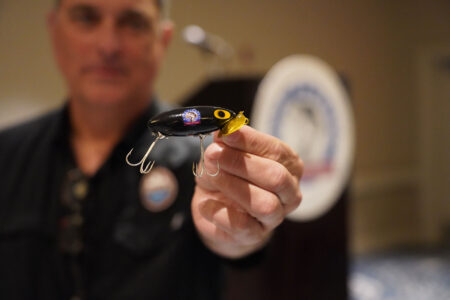Are anglers actually training fish to get hooked? A new study reports that for several species of oceanic sport fish, individual fish that are caught, released and recaught are more likely to be caught again than scientists anticipated.
The study makes use of data from tagging programs, in which researchers tag fish and release them into the wild. When those fish are caught, and the tag information is returned to the researchers, it can give scientists information that informs fishery policies.
“Fisheries researchers who work in tagging programs have long noticed that certain fish seem to get caught repeatedly, and we set out to determine the implications of this phenomenon,” says Jeff Buckel, co-author of the study and a professor of applied ecology at North Carolina State University.
To that end, researchers examined decades’ worth of Atlantic coast tagging datasets on four fish species: black sea bass, gray triggerfish, red grouper and Warsaw grouper. Using a computational model, the researchers determined that – for the black sea bass and both types of grouper – survival was significantly higher after the second, third, and fourth release as compared to the first release.
The paper, “Repetitive capture of marine fishes: implications for estimating number and mortality of releases,” was published in the ICES Journal of Marine Science.
“Think of it this way,” says Brendan Runde, first author of the study and a Ph.D. student at NC State. “Let’s say you tagged 1,000 fish and recaptured 100 of them for a first time. After re-releasing those 100 fish, you would only expect to recapture 10 of them a second time. But that’s not what we’re seeing. We’re seeing much higher numbers of fish getting recaptured after the second time.
“Our hypothesis is that this increase in catch rate stems from selection for robust individuals,” Runde says. In other words, because some fish don’t survive the first release, and you can’t catch a dead fish, the fish that were robust enough to survive their first encounter were more likely to survive following catch-and-release events.
The finding could have a significant impact on stock assessments, not all of it great in terms of angler management. “One might assume that every catch and release in a recreational fishery is a unique fish,” Buckel says. “So that if 5 million black sea bass were caught and released in a given year, that would mean there were at least 5 million black sea bass in a fishery. For these three species of fish and likely many others, that’s just not true. At least some of those 5 million catches were the same fish getting caught over and over again.”
“On the positive side, the study also suggests that for many species fish mortality from being released appears lower than we thought,” Buckel says. “For those species, if a fish survives its first release, it has an even better chance of surviving subsequent releases.”




